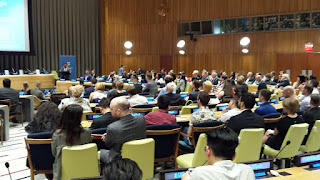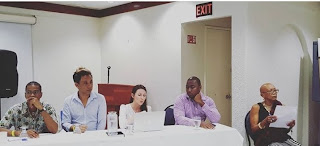LGBTTI OAS Coalition Declaration 2019 Statement in Medellin Colombia
July , 19th, 2019
THE LGBTTTI COALITION CELEBRATES THE CULMINATION OF
ANOTHER SUCCESSFUL GENERAL ASSEMBLY OF THE OAS DESPITE THE INTENT OF THE HOST
GOVERNMENT TO CLOSE SPACES TO CIVIL SOCIETY
Medellin, Colombia
June 2019
The Coalition
of Lesbians, Gays, Bisexuals, Transsexuals, Transsexuals, Transvestites and
Intersex (LGBTTTI) from Latin America and the Caribbean working within the
framework of the Organization of American States (OAS) celebrates the
culmination of another successful General Assembly of the OAS, which included
the adoption of the Omnibus Resolution on Human Rights, which includes the
section entitled "human rights and prevention of discrimination and
violence against LGBTI persons", during its 49th regular session of the
General Assembly, which took place in Medellín, Colombia, on June 27 and 28,
2019.
THE DIALOGUE WITH THE HEADS OF
DELEGATION THE SECRETARY GENERAL, THE ASSISTANT SECRETARY GENERAL AND THE
REPRESENTATIVES OF THE ORGANIZATIONS OF THE CIVIL SOCIETY
During this Dialogue, we saw an
increasing number of allies and allies that integrated a message of equality
for all people and of acceptance of sexual and gender diversity, including a
recently established Coalition entitled Coalition of People Who Exercise Sex
Work, composed of organizations under the Network of Sex Workers of Latin
America and the Caribbean (RedTrasex), part of our LGBTTTI Coalition since
2018. We continue to see that conservative and anti-rights groups promote
messages that violate human dignity and undermine the human rights of LGBTI
people in the Americas. Some of these messages include a narrative that ignores
the legitimacy of the organs of the Inter-American Human Rights System,
including the competence of the Inter-American Commission and the
Inter-American Court of Human Rights to monitor the compliance of States with
the most basic international human rights obligations, which are not subject to
discussion, such as the obligation to guarantee the rights to equality and
non-discrimination.
This year, in the context of the
Dialogue, we observed that some coalitions composed of conservative
organizations distorted concepts such as corruption to openly attack members of
the Inter-American Commission on Human Rights (IACHR), using precepts such as
"gender ideology. "In this regard we emphasize that both experts and
international human rights organizations have criticized the use of this empty
term of real content and that seeks to attack any progress towards equality and
non-discrimination, particularly in relation to gender, sexual orientation ,
identity and expression of gender and sexual characteristics.
We emphasize that in spite of the
considerable advances in terms of policies, laws and judicial recognition in
most of the countries of the Americas, there are many challenges that restrict
the full enjoyment and exercise of our rights. We continue to see high levels
of violence and discrimination in all spheres against LGBTI people, or those
perceived as such, in America. In particular, the Coalition categorically
condemns the wave of murders and violence directed against LGBT people that has
been increasing in recent weeks in Honduras, and encourages the authorities to
adopt all effective measures to respect and guarantee life, integrity and
personal security. of LGBT people, and their defenders.
Likewise, there are still laws,
policies and state practices that criminalize our sexual and affective
relationships that violate our human rights. In this regard, we express our
concern for crimes based on prejudice committed on the basis of sexual
orientation, identity and gender expression, without the States maintaining
official records on such crimes, which hinders their prevention and
investigation.
In addition to the recent
decriminalization of consensual sexual relations between same-sex adults in
Belize and Trinidad and Tobago, the Caribbean Court of Justice issued a ruling
in the McEwan case and others, declaring the rule of Guyana's criminal code to be
unconstitutional that criminalized the use of garments associated with another
gender. Likewise, there have been important advances in Latin American
countries, among which we highlight the adoption of the Comprehensive Trans Law
in Uruguay, the Gender Identity Law in Chile and the approval of equal marriage
in Ecuador, as well as judicial recognition of the co-motherhood in the Satya
case and the recognition of the right to the identity of the girl child, Amada.
As for autonomous sex work, although it
is not explicitly prohibited in most countries of the Americas, there are legal
provisions and laws that criminalize the different acts related to sex work.
This, coupled with the absence of clear regulations that recognize sex work as
work, creates the conditions that foment institutional violence -including
sexual and physical violence, extortion and illegal detentions- and reinforces
the obstacles that prevent sex workers. access to basic health and justice
services. We note with concern that although the IACHR held a first hearing on
human rights violations against women sex workers in 2017, the Commission has
not granted further hearings on this issue, despite numerous requests in this
regard.
We also see with great concern the
emergence of bills or laws that seek to criminalize transmission,
non-disclosure and exposure to HIV, or the misuse of criminal law to
criminalize people living with HIV.
Finally, the
Coalition stresses that the word of civil society is increasingly restricted in
this space. With the high number of coalitions this year (33), each coalition
had only three minutes to make their statement. We call on the OAS to expand
the Dialogue schedule, so that each Coalition has at least five minutes to make
its declaration, regardless of the number of coalitions.
OAS GENERAL ASSEMBLY
The General
Assembly of the OAS was held at the Convention Center of Medellin. Although the
day of the Dialogue was held in one of its largest rooms, the General Assembly
decided to take place in another part of the Center where there was a smaller
maximum capacity. This led to limited entry of civil society participants: only
one representative from each Coalition of civil society was allowed to enter
the room where the General Committee was held and substitutions were not
accepted. On the other hand, the first day a great controversy was generated
because the entrance of the members of the civil society to the Plenary was
severely limited, although it was evident that there was enough space in the
room to place more chairs and allow access to all the people present. Given
this situation and at the end of the first day, the society organizations
directly claimed the Chancellor, Secretary General and Deputy Secretary
General, the situation worsened when the General Secretariat sent a statement
indicating that only three representatives of each Coalition could have access
to the venue. General Assembly, that is, only 99 people would be allowed
access. There was also a tacit agreement that the first 300 people who arrived
at the Convention Center would enter. This meant that on the second day, the
representatives of civil society waited standing in line outside the Convention
Center from 6 am to 10:30 am, when the doors finally opened, before the
complaint of the attendees. Likewise, the General Committee of the second day
was held without the presence of civil society, and after our constant
complaints and that more chairs were placed in the Plenary, it was finally that
we managed to access the site.
We reiterate
our deep rejection of the attempt to close spaces for civil society, led by the
Colombian government in the context of the OAS General Assembly, and we call on
the OAS to ensure that similar situations do not happen again.
The Coalition takes note of the
re-election of the Commissioners to the Inter-American Commission on Human
Rights (IACHR): Esmeralda Arosemena de Troitiño (Panama) and Margarette May
Macaulay (Jamaica) and the election of Julissa Mantilla (Peru) and Edgar Stuardo
Ralón ( Guatemala). In relation to the re-election of Commissioners Arosemena
and Macaulay, the Coalition wishes to highlight its great commitment to respect
and guarantee the human rights of all people, without discrimination based on
gender, sexual orientation, identity and gender expression and sexual
characteristics.
We encourage the Inter-American Commission
to continue protecting the rights of all persons, without discrimination on
grounds of sexual orientation, gender identity, gender expression and sexual
characteristics, thus supporting the proper interpretation of the principles of
equality and non-discrimination enshrined in the Inter-American human rights
instruments.
THE RESOLUTION ON THE RIGHTS OF
LGBTI PEOPLE
This year the
resolution was presented by thirteen OAS countries: Argentina, Belize, Brazil,
Bolivia, Canada, Chile, Colombia, Costa Rica, Ecuador, El Salvador, the United
States, Mexico and Uruguay.
The
resolution continues to have the same essential content as in previous years,
but it adds for the first time the category "sexual characteristics",
together with the categories "sexual orientation, identity or gender
expression". Thus, this year the General Assembly of the OAS approved a
strengthened resolution that has the same content as the previous resolutions,
but includes greater protection for intersex persons.
This Resolution is the result of the
hard work that the LGBTTTI Coalition has been developing since 2007 in the OAS.
As on previous occasions, their presence and continued participation in
different actions and dialogues with the OAS Member States during the General
Assembly counteracted the intolerant actions and hate speech of fundamentalist
and anti-rights organizations that tried to stop the approval of said Resolution.
The Resolution was again successful
this year, despite opposition from countries led by Paraguay, Saint Lucia and
Jamaica; countries that precisely stand out for their lack of protection of the
human rights of LGBTI people internally in their countries. A small minority of
the OAS member states included footnotes in the resolution. This year the
resolution has the lowest number of footnotes that have been included in this
resolution so far, since this practice began in 2013. Only seven countries
placed footnotes or announced the incorporation of these (Barbados , Guatemala,
Jamaica, Trinidad and Tobago, Paraguay, Saint Vincent and the Grenadines and
Saint Lucia), compared to twelve footnotes in 2013.
THE ANNUAL MEETING OF THE COALITION
More than 70 LGBT activists from Latin
America and the Caribbean, representatives of Coalition organizations and
organizations that are not members of our Coalition, met in Medellin to attend
our annual meeting and the General Assembly. During the three days of our
annual meeting, which, as every year is open to any LGBT organization that
wants to participate, important issues related to strategy and advocacy work
were discussed. In addition, the Coalition decided to incorporate the following
organizations into the Coalition: Afirmativo Caribbean (Colombia), Acceder
Foundation (Costa Rica), Las Reinas Chulas, Cabaret and Human Rights A.C.
(Mexico) and Dominican Diversity (Dominican Republic).
ACKNOWLEDGEMENTS
We would like to thank Akahatá -
Sexualities and Genders Work Team, Arcus Foundation, COC - Netherlands, IPAS,
Latin American and Caribbean Trans Persons Network (Redlactrans), Latiomerican
and Caribbean Network of Sex Workers and Synergy - Initiatives for Rights
Human, as well as the numerous financial efforts made by different
organizations within our Coalition, to guarantee our participation in this
General Assembly of the OAS and annual meeting.
The LGBTTTI Coalition highlights the
commitment of Catherine Pognat and the entire OAS Department of Social Inclusion
to achieve a successful General Assembly where there were important advances in
terms of dialogue, including a space of "improbable dialogues", which
sought to promote the exchange of ideas between groups with radically opposed
positions regarding the recognition of human rights.
We ask all OAS Member States to
continue guaranteeing the protection and promotion of the rights of LGBTI
persons, and to repeal the laws that criminalize or discriminate against us. We
urge all OAS member states to take measures to promote the legislative,
administrative and judicial reforms necessary to adapt their legal systems,
interpretations and practices to the standards established in Advisory Opinion
No. 24/17, issued by the Inter-American Court. in November 2017 and to respect
its binding nature.
We encourage the OAS Member States to
follow the leadership shown by Uruguay, which became May 2018, the first
country to ratify the Inter-American Convention on all forms of Discrimination
and Intolerance.
****



Comments
Post a Comment